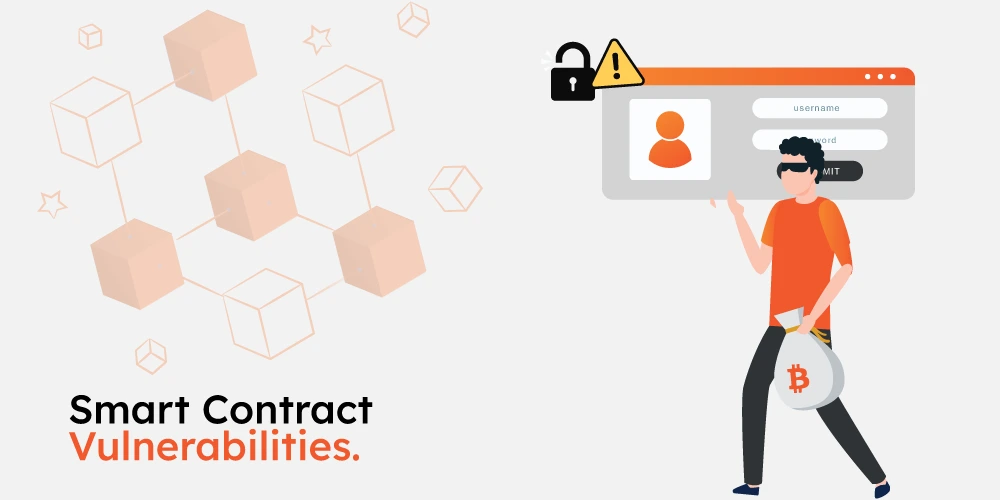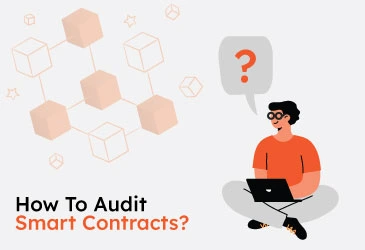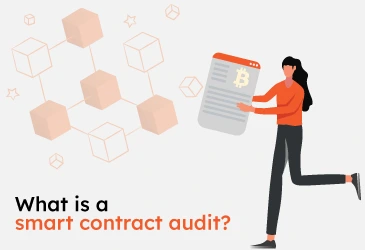Smart Contract Vulnerabilities
Updated : May 13, 2023

Smart contracts have revolutionized how we conduct transactions and execute agreements in the digital age. These self-executing programs are built on blockchain technology and enable secure, transparent, decentralized transactions without intermediaries. However, smart contracts are vulnerable to security risks and exploit like any other software program. This blog will explore some of the most common smart contract vulnerabilities and best practices to mitigate them.
What Are Smart Contract Vulnerabilities?
Smart contract vulnerabilities refer to the security risks associated with the code of a smart contract. Hackers or malicious actors can exploit these vulnerabilities to manipulate the contract's behavior or steal funds. The following are some of the most common smart contract vulnerabilities:
Reentrancy Attacks
Reentrancy attacks occur when an attacker repeatedly calls a function within a smart contract before the previous function call completes. This can cause the contract to execute unintended actions, such as transferring funds to the attacker's account. The infamous DAO hack in 2016 is an example of a reentrancy attack. Mitigate risks and enhance the integrity of your blockchain projects with our specialized Smart Contract Auditing services.
Integer Overflow and Underflow
Integer overflow and underflow occur when the value of an integer variable exceeds its maximum or minimum limit. This can lead to unexpected behavior in the smart contract, such as transferring more funds than intended or causing the contract to freeze
Unauthorized Access
Unauthorized access vulnerabilities occur when the smart contract allows unintended parties to access its functions or data. This can result in sensitive information leaks or funds being transferred to unauthorized accounts. Learn more about types of smart contracts.
Timestamp Dependence
Timestamp dependence vulnerabilities occur when the behavior of the smart contract is dependent on the current time. This can allow attackers to manipulate the contract's behavior by changing the system time or delaying transactions
Denial of Service (DoS) Attacks
DoS attacks occur when an attacker floods the smart contract with transactions or requests, causing it to slow down or crash. This can lead to a loss of funds or a disruption of the contract's intended functionality.
Best Practices to Mitigate Smart Contract Vulnerabilities
To mitigate smart contract vulnerabilities, developers should follow best practices in smart contract development. The following are some of the best practices to consider:
Follow the Principle of Least Privilege
Developers should follow the principle of least privilege when designing smart contracts. This means the contract should only have the minimum required permissions and access to perform its intended functions. Unnecessary permissions and access should be avoided to reduce the attack surface of the contract
Use Safe Math Libraries
To prevent integer overflow and underflow vulnerabilities, developers should use safe math libraries that ensure arithmetic operations stay within safe bounds.
Avoid Timestamp Dependence
Developers should avoid timestamp dependence by using block numbers or block timestamps to determine the timing of contract execution
Implement Access Control
Developers should implement access control mechanisms to ensure only authorized parties can access the contract's functions and data. This can be done using authentication and authorization mechanisms such as whitelists or multi-signature schemes.
Perform Code Audits and Testing
Smart contract code should be audited and tested thoroughly to identify and fix vulnerabilities. Developers should use automated testing tools, manual code reviews, and third-party audits to ensure the contract's security
We Can Help You Build Secure And Reliable Smart Contracts!
Smart contract vulnerabilities are a significant risk that blockchain developers must take seriously. However, by following best practices and implementing security measures, developers can mitigate these risks and ensure the safety and reliability of their smart contracts. By doing so, we can continue to unlock the full potential of blockchain technology and usher in a new era of decentralized applications.
If you want to develop secure and reliable smart contracts for your blockchain project, our team of experts is here to help. Our blockchain development services are tailored to meet your specific needs, whether you're looking to develop a new blockchain application or optimize an existing one. Contact us today to learn how we can help you build secure and reliable smart contracts for your blockchain project.
Take control of your smart contract security - Request a professional Smart Contract Audit today and ensure the solidity of your blockchain projects
Insights

Smart Contract Audit Checklist
Smart contracts are self-executing agreements with the terms of the agreement between buyer and seller being directly written into lines of code ...

How To Audit Smart Contracts?
Smart contracts have become increasingly popular over the years as they provide a more efficient way of executing transactions in a decentralized ...

What Is A Smart Contract Audit?
Smart contracts are self-executing agreements that run on a blockchain network, allowing for secure and decentralized transactions. Smart contracts ...